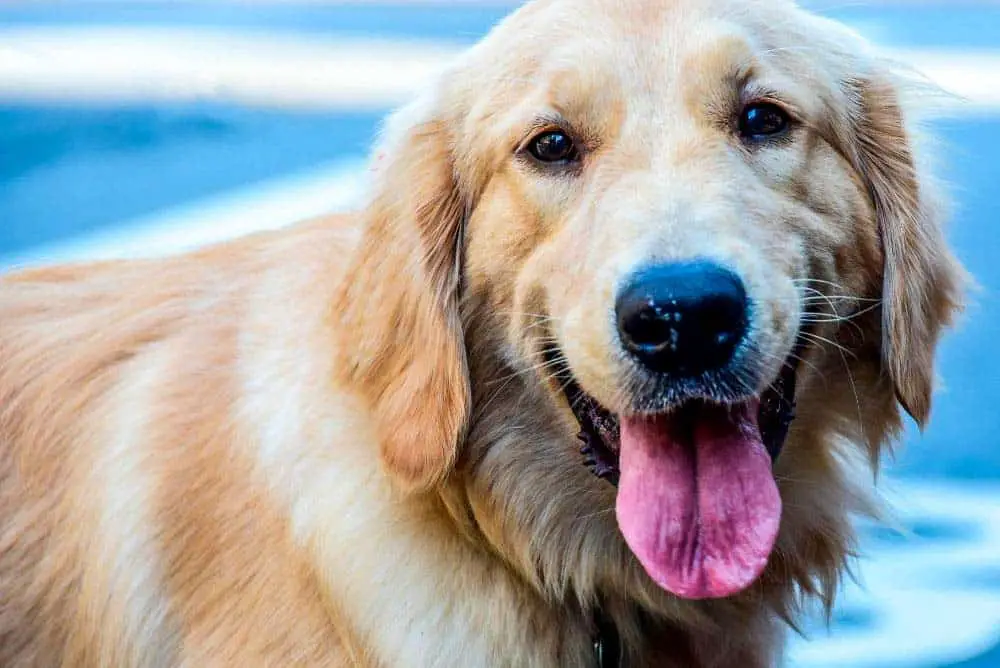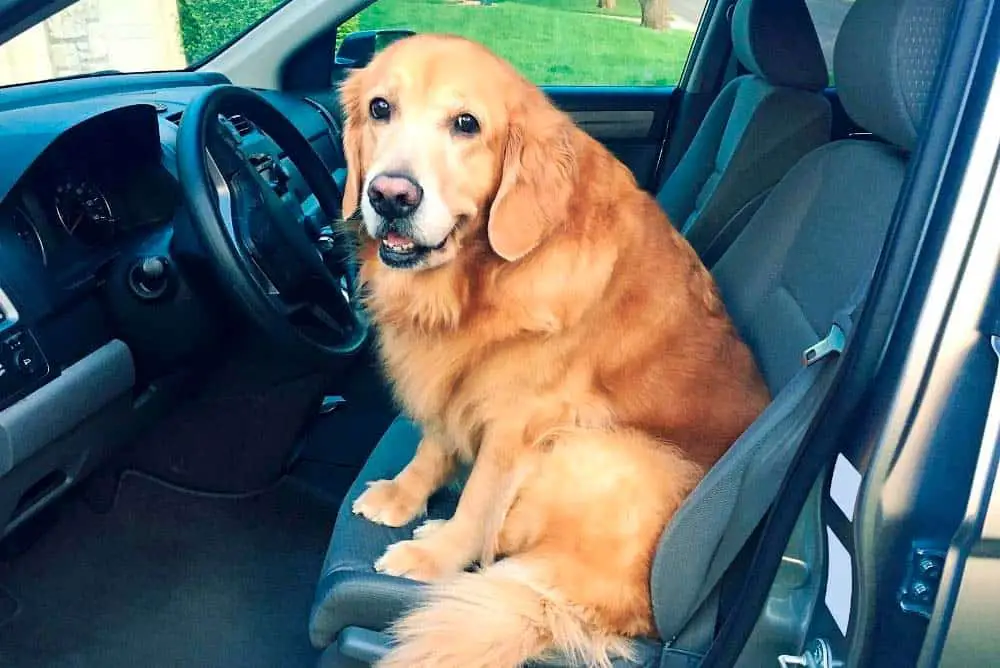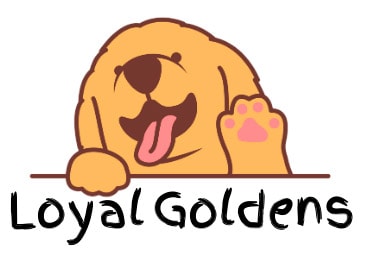There are many unchangeable facts of life, including the fact that both babies and dogs are bound to drool. Still, excessive drooling in a Golden Retriever can be both unhygienic and a sign of health issues. That’s why it’s crucial to familiarize yourself with what’s normal and what’s not when it comes to drooling.
A Golden Retriever might drool excessively because they are attempting to cool themselves off, hungry, or experiencing dental issues. Anxiety can also induce drooling, as can poisoning and some forms of illness. If you notice signs of excessive drooling that do not stop, you should contact your vet right away.
In this article, we’ll discuss all of the various reasons why a Golden Retriever might start drooling, and how much is too much drool for the average pup. We’ll also examine solutions, including immediate veterinary care.

(This article may contain affiliate links and loyalgoldens may earn a commission if a purchase is made.)
Unlock your goldens natural intelligence and see just how quickly problem behaviors disappear.This is the best at home dog training I've ever used!
11 Reasons Golden Retrievers Drool
Dogs may be loving, affectionate, and incredibly intelligent creatures, but they’re not always the cleanest. If you’re in the kitchen cooking some burgers for dinner, your pup is likely laying by your feet, drooling expectantly and licking any errant flicks of grease that fall to the floor.
While a dog’s drooling can be a little gross, it’s typically not a sign of illness or injury. However, owners that notice excessive salivation, especially paired with other symptoms, may want to contact their veterinarian and schedule an examination.
Some of the most common reasons that Golden Retrievers drool include:
- Overheating
- Hunger
- Dental Issues
- Obstructions
- Bloat
- Motion Sickness
- Anxiety
- Poisoning
- Liver Disease
- Seizures
- Rabies
If you’re unfamiliar with your dog’s eating patterns and behavior, it could be difficult for you to determine the exact cause behind your dog’s drooling. However, if you’re observant and patient, you may get your answer.
Of course, some reasons for drooling, such as poisoning, require immediate emergency medical care. When drooling is combined with other types of symptoms, including lethargy, difficulty walking, and vomiting, veterinary care is crucial.
Still, the majority of Golden Retrievers will drool when they’re feeling hot, or if they see you eating something tasty. Keeping them cool and well-fed can help prevent a significant amount of doggy saliva from ending up on your floors, furniture, and clothing.
Overheating
When dogs get too hot, they don’t sweat to keep themselves cool the way that humans do. Instead, they seek shelter or shade, they rest, and they pant. Opening their mouths and letting their tongues loll out might seem like a strange way to cool down, but it’s relatively effective.
The hot air inside of their lungs is instantly replaced with cool outdoor air with every breath, and as that breath moves across their tongue, it helps the moisture inside of their mouth evaporate. Just as our bodies begin to feel pleasantly cool as sweat evaporates from our bodies, dogs can begin to cool down as saliva evaporates from their tongues.
However, dehydrated, malnourished, or aging pups can be particularly prone to overheating and its negative effects. It’s vital to keep your dog cool during the hot summer months by providing some type of shelter or keeping them indoors during the daytime.
This can help them retain more moisture and prevent dehydration. It can also help prevent a significant amount of heat-related drooling.
Hunger
When dogs experience hunger, they begin to drool. Human beings do the same thing. If you begin imagining one of your favorite foods, you’ll likely begin to salivate more actively. This happens because we are anticipating being fed. Saliva is an important part of eating, and mammals tend to produce an excess amount of it before they start chowing down.
If your pup is salivating excessively around mealtime, they’re simply looking forward to wolfing down their food. If your Golden Retriever is salivating while watching you eat, it means they expect you to feed them some of your food.
You may have slid your furry friend some table scraps in the past, leading them to believe you will do soon again. When this behavior presents itself, you can either correct it or encourage it. However, for Golden Retrievers to stay healthy and fit, they shouldn’t be eating a lot of “people” food.
Dental Issues
One of the most significant health issues facing dogs of all breeds is dental care. Many pet owners do not brush their dog’s teeth, which can lead to plaque build-up and tooth decay. When a dog’s teeth are in bad shape, the rest of their body typically follows suit. A single tooth infection could lead to sepsis and even death.
Consequently, it’s crucial to keep your dog’s teeth clean. If you notice that your dog is drooling far more than they typically do, they may have an abscess, periodontal disease, or gingivitis. Taking them to a veterinarian for dental cleanings and services can help your pup avoid these uncomfortable conditions.
Obstructions
When a Golden Retriever swallows something it shouldn’t, it could get lodged in its throat or between its teeth. This can cause the body’s tissue to become agitated and inflamed, leading to swelling and drooling.
Excess salivation occurs as a response to mouth and throat obstructions as the body attempts to lubricate the obstruction, allowing it to either pass into the digestive system or be vomited up and out of the body. Checking your dog’s teeth, mouth, and throat every day or weekly can help you identify potential obstructions.
For example, decaying teeth can begin to break apart and cause problems. A Golden Retriever may even swallow part of their tooth, causing an obstruction. But if you’re aware that they’re experiencing dental issues, you can contact a veterinarian and schedule an appointment to solve those issues, preventing an obstruction.
Bloat
Digestive issues can contribute to excessive drooling, especially a disorder known as bloat. This issue occurs when the stomach fills up with gas, causing discomfort and potentially shock. If you notice that your Golden Retriever’s stomach seems somewhat inflated and distended, seek immediate veterinary care.
Motion Sickness
If you’re accustomed to taking your Golden Retriever everywhere with you, including in the car, then you may have noticed some excess drooling. Some dogs can get motion sickness while riding in a car, causing them to feel nauseous. When they experience nausea, like humans, they can begin to salivate excessively.
There are a few ways that you can help eliminate or lessen a dog’s motion sickness, thereby helping you to avoid a drool-stained car interior. You could secure your dog to its seat with a specialized seatbelt, or put helpful window blockers on the side windows. Your veterinarian may also prescribe a medication to help your dog experience less nausea while riding around.

Discover how to train your Golden Retriever by playing games: 21 games to play with your Golden that will make them smarter and better behaved!
Anxiety
Golden Retrievers are friendly, loyal dogs. As such, they can suffer from separation anxiety. This stress can take the form of panting and drooling. Just like humans may develop sweaty palms or armpits when stressed-out or anxious, dogs can also begin to feel hot and uncomfortable, leading them to pant.
If you ever notice a panting, drooling dog in a comfortable air-conditioned indoor space, it’s experiencing anxiety. An anxiety jacket like this one (Amazon) can help dogs avoid this type of anxiety. The tightness of the jacket will help your golden to feel more secure. These jackets also work well to calm your dog during thunderstorms and fireworks.
Poisoning
While the average Golden Retriever might end up eating quite a few table scraps (especially if they’re part of a household with children), there are plenty of things that they can’t eat. Understanding what types of plants and foods are poisonous to dogs is the first step to protecting your pup from accidental poisoning.
21 Common Human Foods That Are Poisonous to Dogs
- Chocolate
- Onion
- Garlic
- Grapes
- Macadamia Nuts
- Avacado
- Caffeine
- Yeast Dough
- Bacon
- Cheese
- Milk
- Alcohol
- Fruit pits (cherry, peach, apricot)
- Mustard seeds
- Gum
- Raisins
- Apple cores (seeds are poisonous)
- Walnuts
- Moldy foods
- Hops (used for making beer)
- Xylitol (an artificial sweetener)
However, dogs can also get into kitchen or bathroom cabinets and unlocked laundry rooms. If your Golden Retriever consumes laundry soap, cleaning fluid, or any other type of poisonous substance, they can begin to drool as a response. Unfortunately, it’s not always possible to keep a constant eye on your pets.
If you find that your Golden Retriever is drooling excessively and has been near potentially poisonous foods or chemicals, you should take them to an emergency veterinary clinic as soon as possible. Poisoning becomes more damaging and effective the longer it is allowed to occur, so quick treatment can save your dog’s life.
Liver Disease
Liver damage and disease can also cause excessive salivation in dogs. It’s not clear why liver failure causes excessive drooling, but it’s something that is also observed in humans. Ensuring that your Golden Retriever is enjoying a highly nutritious diet and plenty of fresh, clean water can help them avoid liver damage.
However, it’s also essential to consult with your dog’s veterinarian and ask about any tests for kidney and liver functioning. They will likely test your Golden Retriever’s urine for signs of infection, as damaged livers are more prone to developing bacterial issues.
Seizures
Seizures can cause excessive drooling in dogs. When a dog is experiencing a seizure, they can develop foamy saliva or drool. However, saliva should be the last thing you’re worried about if your dog is experiencing seizures.
It is far more important to learn how to manage your pup’s seizures, treat them, and handle seizures properly when they occur. Seizures are often painful, debilitating episodes that are entirely out of an animal or person’s control. It’s crucial to be gentle with a Golden Retriever during and after it’s experienced a seizure.
Rabies
Unfortunately, rabies also causes excessive drooling and foaming at the mouth. A dog with rabies will also likely exhibit several other symptoms, making it relatively easy to diagnose it. For example, rabies can cause hydrophobia, seizures, difficulty walking, and loss of appetite.
Annual rabies vaccination can help protect your dog from contracting this disease. It’s also important to house your Golden Retriever indoors, especially during the night. Doing so can help prevent bites from wild animals that carry rabies.
When Is Drooling Excessive?
Drooling can be considered excessive when it begins to cause serious health issues. When a Golden Retriever has problems swallowing due to the amount of saliva in its mouth, or it begins to vomit-up spit, there is a medical issue that requires an immediate solution.
Owners will become familiar with their pup’s normal level of drool, especially with a veterinarian’s help. Some dog breeds have larger, droopier jowls than others, allowing for more spit to gather in the folds of the mouth. This can cause drooling that is completely normal and harmless. Golden Retrievers can express this physical trait, making them a drool-friendly breed.
Daily brushing can help owners become more familiar with their dog’s oral health, helping them to notice broken or chipped teeth more quickly. Saliva that is foul-smelling, pink, or tinged with blood should be taken extremely seriously.
Golden Retrievers that exhibit drool with these symptoms often require urgent care. However, if your pup is drooling because they’re hungry or hot, a trip to the vet might be overkill.
What to Do If Golden Retriever Is Drooling a Lot
If your Golden Retriever is drooling excessively, there are several things you can do to help. But before you act on any of the following solutions, you first need to determine why your pup is drooling. If you can’t do that, it may be best to simply visit a veterinarian for assistance.
Still, sometimes a Golden Retriever just needs a few minutes of air-conditioned rest after spending hours running around in the hot sun. Or, they may need to eat a snack to avoid drooling all over themselves watching you eat dinner.
Here are some solutions you can try to help your dog drool a little less.
Help Them Keep Cool
If your dog is hanging out outside on a hot day, they’ll likely start drooling to keep themselves cool. You can bring your dog inside and make sure that the air conditioning is turned on to help them regulate their body temperature. This can help put an end to heat-related drooling.
You could also provide ice cubes for your Golden Retriever to lick and eat. Just be sure that your dog’s teeth are healthy and strong before letting them chew on ice. It may also be helpful to allow your dog some access to a dog-controlled outdoor water fountain.
The TrioGato Pet Water Fountain (Amazon) has all the practicality and ruggedness that dogs require. The quick wit of a Golden Retriever ensures that it can quickly learn how to operate this paw-press fountain. This can help keep outdoor dogs cool, even on the hottest and most humid summer days.
Give Them a Snack
As Pavlov once famously discovered, dogs tend to salivate when they’re expecting to be fed. Your pup may begin drooling around their feeding time every day, or they may begin to salivate while watching you eat something particularly tasty.
When a dog’s drooling is caused by hunger, the solution is simple. Giving them a snack or filling up their bowl with nutritious kibble can help this type of drooling subside. However, owners that notice saliva build-up during these moments can always keep a drool rag handy for quick clean-ups.
Check the Mouth
If you’ve been brushing your dog’s teeth, then you’ll likely already be doing this regularly. However, if you’re not accustomed to checking your dog’s mouth and throat for obstructions, this can be a little tricky. You may want to put on a pair of gardening gloves to help protect your hands, but be sure to look at the teeth for signs of chipping and breaks.
Also, check your dog’s gums. If they’re bleeding or swollen, they may be suffering from dental pain or disease that is causing excess salivation. In addition, dogs are notorious for chewing on things they shouldn’t and swallowing all sorts of things.
If your dog is having difficulty swallowing its spit, it may have a blockage or obstruction in its throat. This type of issue isn’t as simple as applying some toothpaste or feeding some snacks. If your Golden Retriever is having difficulties swallowing, breathing, or there are noticeable signs of bleeding and swelling, veterinary care is absolutely required.
Visit a Veterinarian
If you’re not sure why your pup is drooling so much, or if you notice signs of bleeding, discomfort, or failed digestion (vomiting, diarrhea, bloating), you may want to reach out to a veterinarian for help. Vomiting and lethargy can also be symptoms of poisoning, which requires emergency care.
By keeping a close eye on your dog’s drooling habits and restricting their access to potential dangers, you can help ensure their safety. And while it may not be fun to rush your Golden Retriever to the vet for an emergency stomach pump, it could save your four-legged family member’s life.
Final Thoughts
Golden Retrievers can develop drooling problems if they have overly large jowls, especially as the spit collects in the folds of their mouth. However, Golden Retrievers may also drool excessively when they’re overheated or hungry. Dental issues and obstructions can also cause salivation, as can poisoning and certain diseases and medical conditions.
If you’re unsure about whether or not your Golden Retriever is drooling too much, you can try keeping them cool and well-fed and observing their salivation. If they continue to salivate or exhibit other worrying symptoms, a trip to your local veterinarian may be the best course of action.
More Golden Retriever Articles You’ll Love!
- How to Care for Golden Retriever’s Teeth: A Step-by-Step Guide
- Is Your Golden Retriever Lonely? (How to Tell & What to Do!)
- The 19 Best Toys Golden Retrievers Will Actually Play With!
- How to Care for Golden Retriever Ears (Step-by-Step Guide)
